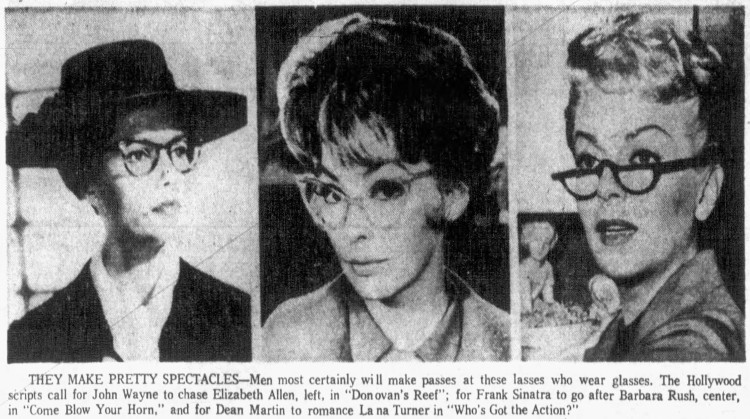Originally and chiefly American English, the phrase men seldom make passes at girls who wear glasses, and its variants, mean that men do not consider bespectacled women attractive.
This phrase originated as a two-line poem titled News Item, published in Enough Rope (New York: Horace Liveright, 1926), by the U.S. poet, short-story writer, critic and satirist Dorothy Parker (née Rothschild – 1893-1967):
News Item
Men seldom make passes
At girls who wear glasses.
Very soon, this poem became a cultural reference—as illustrated by the misquotation in this passage from The Flirt, by Carol Bird, a short story published in the Tampa Morning Tribune (Tampa, Florida) of Sunday 26th August 1928:
Now he was filled with regrets and remorse. He loved Laurine Constantius. And he was going to marry—Marie Anne Maitland. Marie Anne Maitland! Why, he pondered unchivalrously, the girl was a dud, a washout. And suddenly a Dorothy Parker verse started buzzing through his brain:
Men never make passes
At girls who wear glasses.
Well, he, erratic fool that he was, had made passes at a girl who wore glasses! And he had won!
Very soon too, Dorothy Parker’s poem became an adage. For example, in her column Beauty and You, published in The Evening Gazette and Republican (Cedar Rapids, Iowa) of Saturday 8th February 1930, Viola Paris used an impersonal verb to introduce it:
It has been said that
“Men seldom make passes
At girls who wear glasses,”
but no young woman needing spectacles should be discouraged by this rhyme. Glasses may be worn inconspicuously and often with distinction.
Dorothy Parker’s text inspired the U.S. poet Ogden Nash (1902-1971) in Hard Lines (New York: Simon and Schuster, 1931):
Lines Written to Console Those Ladies Distressed by the Lines “Men Seldom Make Passes, etc.”
A girl who is bespectacled
Don’t even get her nectacled,
But safety pins and bassinets
Await the girl who fascinets.
Dorothy Parker’s poem has given rise to jocular extensions and variants playing on glasses in the sense of eyewear and glasses in the sense of drinking containers.
The earliest that I have found is from the column On Broadway, by the gossip columnist Walter Winchell (1897-1972), published in the Reading Times (Reading, Pennsylvania) of Wednesday 9th December 1931:
Quiteso, Quiteso
It is Dorothy Parker’s theory that men never make passes at girls who wear glasses. David Murray queries—“but how about girls who empty ’em?”
Olin Miller expressed the same idea in Sunland Shorts, published in the Miami Daily News (Miami, Florida) of Friday 13th September 1935:
But men often make passes at girls who drain glasses. (With an apology to Dorothy Parker, if she insists upon it.)
The same idea again, in a different form, from Mailbag Bulletins, by Hal Boyle, published in the Oakland Tribune (Oakland, California) of Monday 16th November 1959:
New Version
Gag of the week: “Many men who never make passes at girls who wear glasses,” point out comics Phil Ford and Mimi Hines, “always make passes at girls who hold glasses.”
Dorothy Parker’s poem has also given rise to jocular variants playing on the phonetic proximity between glasses and grasses—as in the following from It Happened Last Night, by Earl Wilson, published in The Winona Republican-Herald (Winona, Minnesota) of Wednesday 3rd March 1954:
In Hawaii, notes Harry Rolnick, boys make passes at girls who wear grasses.
The word girls has sometimes been replaced by lasses, which rhymes with both passes and glasses—as in the caption to this photograph published in The South Bend Tribune (South Bend, Indiana) of Friday 23rd November 1962:
THEY MAKE PRETTY SPECTACLES—Men most certainly will make passes at these lasses who wear glasses. The Hollywood scripts call for John Wayne to chase Elizabeth Allen, left, in “Donovan’s Reef”; for Frank Sinatra to go after Barbara Rush, center, in “Come Blow Your Horn,” and for Dean Martin to romance Lana Turner in “Who’s Got the Action?”
A Dictionary of Catch Phrases British and American, from the Sixteenth Century to the Present Day (Taylor & Francis, 2005), by Eric Partridge and Paul Beale, indicates the existence of only asses make passes at lasses who wear glasses. However, I have found no actual use of this particular variant.

